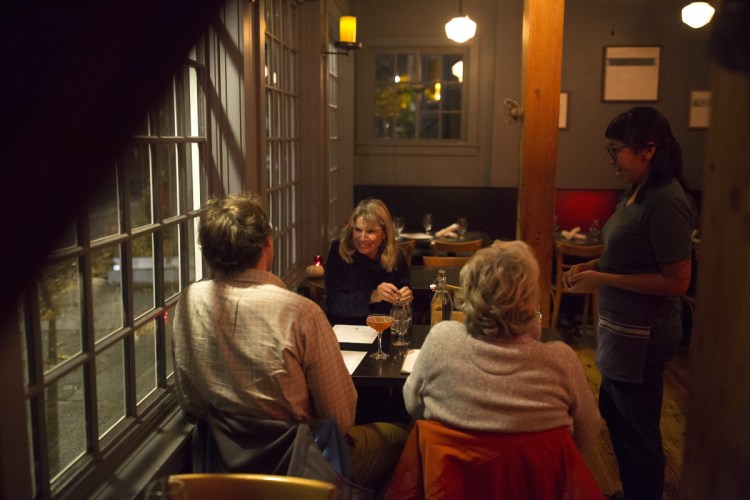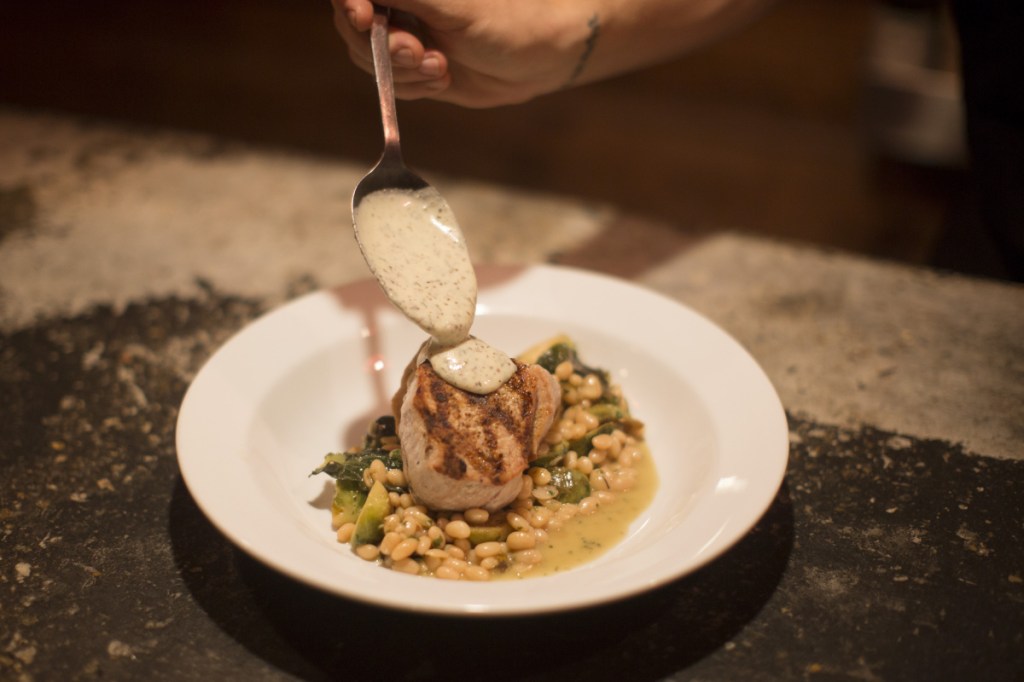“Lots of people knew it was coming,” my server tells me when I ask about the recent change in management at Portland’s Blue Spoon. “But I don’t think most people realized it was coming so quick. It was like a magic trick where someone moves your card when you’re not paying attention.”
Unless you live on Munjoy Hill or are someone who follows restaurant news closely, you probably didn’t even realize that David Iovino, the chef and owner since Blue Spoon opened 14 years ago, recently handed the reins of his business over to new owners: general manager Elizabeth “Liz” Koenigsberg (555, Petite Jacqueline, Aurora Provisions) and her husband, chef Will Lavey (formerly of Petite Jacqueline and Sur Lie, as well as Vita in Denver). “Liz and I got our ducks in a row, then I came in and shadowed David for five days in August, and that was that; it just happened really fast,” Lavey told me.
Inside, almost nothing structural has changed, from the configuration of the 32 seats, to the well-stocked bar that now serves riffs on a half-dozen classic cocktails, like a smoky-sour Last Word ($13) and a bittersweet Paper Plane ($13). Sure, the old artwork has been swapped out for blue-and-white, impressionistic mixed-media pieces featuring silhouettes of flooring nails, and there’s a new shelf over the serving station to create a true pass-through into the kitchen, but that’s about all.
Look a little closer, and further differences start to resolve. The front-of-house team, for example, is almost all new. If you’re searching for a familiar face and you haven’t visited since early this summer, you might be in for a surprise.
But perhaps most significantly, the coconut flan is gone.
In a 31/2-star review of Blue Spoon from 2015, our then-reviewer praised its “dense, silky custard,” and commented how it, like much of Iovino’s menu, was “comforting and familiar.”
So familiar that the jiggly dessert became known as Blue Spoon’s signature dish. “This summer, there was one guy who apparently made a special trip up to Maine for his birthday, and he pre-ordered one huge flan to eat in the restaurant, and then another one to take home with him because he knew he couldn’t get it anymore,” our server said.
When I asked Lavey about the disappearance of the famous custard, he acknowledged that ditching it was a hard, but necessary decision. “We could try to replicate it, but even if we got it exactly the same, it still belonged to (Iovino) as much as the Blue Spoon. So we do the respectful thing and let him be remembered for it,” he said. “We have to make our own mark. But frankly, the style of his menu and the way it was executed, I wouldn’t make it much different. Plus, you know he changed the menu all the time himself, so people are used to change here.”
Frequent updates suit a modern American bistro-style restaurant focused on seasonality and relationships with farmers. So in the autumn, you’ll find the substantial Mixed Salad ($11), brawny yet sweet with roasted Delicata squash, apple slices and red onion, all topped generously with irregular crumbles of Vermont Creamery goat cheese.
Or one of the few holdovers from the old menu, now enjoying its own seasonal final days at Blue Spoon: al dente charred local cauliflower with torn mint leaves, dates and a too-stingy drizzle of racy garlic tahini ($8).
As good as the vegetable dishes are, the new menu is pockmarked with uneven or poorly executed items. On the Atlantic pollock entree ($27), for example, the vegetable accompaniment of braised kale and caramelized fennel atop a buttery parsnip puree is fantastic. But on my recent visit, the fish – folded over onto itself three times and roasted in butter – was tepid and raw inside, its barely cooked exterior hidden by an inelegant mound of buttered breadcrumbs.
The reverse was true of my appetizer of Portuguese-esque baby octopus in piri piri sauce ($8). Here, the snappy, tart pickled shallot and radish were excellent, but the octopus itself was watery and grievously overcooked. “Like chewing gum with suction cups,” my guest offered. We could not finish the dish.
Even dessert isn’t immune from a bump or two. The main part of one dish – warm, homey ricotta beignets ($8), fresh from the kitchen’s tiny home-appliance fryer – is superb eaten on its own. But dip the little egg-shaped fritters into what I thought was curd and turned out to be a whizzed-up boiled lemon (the whole fruit: pith, skin and all), and every bite becomes bitter. Not even the crop-dusting of powdered sugar is enough to counteract it, as intended.
Occasionally though, everything comes together as it should, and it’s possible to see Lavey’s skills in full flight. Take the grilled Broad Arrow Farm pork loin served with bacony white beans, roasted Brussels sprouts and a creamy dill-and-mustard sauce ($28). It’s a precisely balanced plate, with lightness from sherry vinegar and a breadth of textures and flavors that draw you back until suddenly, it’s all gone. That is, as long as your server brings you a sharp knife. Ours did halfway through our entrees, laughing nervously as he set it down on the table. “Sorry. I’m new here,” he said. “We all are.”

A recent addition to the menu is Angus steak tartare.
Andrew Ross has written about food and dining in New York and the United Kingdom. He and his work have been featured on Martha Stewart Living Radio and in The New York Times. He is the recipient of two 2018 Critic’s Awards from the Maine Press Association. Contact him at:
andrewross.maine@gmail.com
Twitter: @AndrewRossME
Send questions/comments to the editors.




Success. Please wait for the page to reload. If the page does not reload within 5 seconds, please refresh the page.
Enter your email and password to access comments.
Hi, to comment on stories you must . This profile is in addition to your subscription and website login.
Already have a commenting profile? .
Invalid username/password.
Please check your email to confirm and complete your registration.
Only subscribers are eligible to post comments. Please subscribe or login first for digital access. Here’s why.
Use the form below to reset your password. When you've submitted your account email, we will send an email with a reset code.